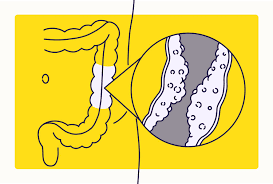
Inflammatory Bowel Disease
Inflammatory bowel disease (IBD) also known as Crohn's disease which causes inflammation of the tissues in digestive tract, which can lead to abdominal pain, severe diarrhea, fatigue, weight loss and malnutrition.
Inflammation caused by Crohn's disease can involve different areas of the digestive tract in different people, most commonly the small intestine (Jenjum and ileum). This inflammation often spreads into the deeper layers of the bowel.
Crohn's disease can be both painful and debilitating, and sometimes may lead to life-threatening complications. There's no known cure for Crohn's disease, but therapies can greatly reduce its signs and symptoms and even bring about long-term remission and healing of inflammation.
Sign and Symptoms
- Diarrhea
- Fever & fatigue
- Abdominal pain and cramping
- Bloody stool
- Mouth sores
- Reduced appetite and weight loss
- Pain or drainage near or around the anus due to inflammation from a tunnel into the skin (fistula)
- Inflammation of skin, eyes and joints
- Inflammation of the liver or bile ducts
- Kidney stones
- Iron deficiency anemia
- Delayed growth or sexual development, in children
Complications
- Compromised immune system
- Autoimmune system
- Heredity
Causes
The exact cause of Crohn's disease remains unknown. Previously, diet and stress were suspected, but now doctors know that these factors may aggravate, but don't cause, Crohn's disease. Several factors likely play a role in its development.
- Immune system. It's possible that a virus or bacterium may trigger Crohn's disease; however, scientists have yet to identify such a trigger. When the immune system tries to fight off an invading microorganism or environmental triggers, an atypical immune response causes the immune system to attack the cells in the digestive tract, too.
- Crohn's disease is more common in people who have family members with the disease, so genes may play a role in making people more likely to have it. However, most people with Crohn's disease do not have a family history of the disease.
Risk factors
- Age (typically before 30, can occur at any age)
- Ethnicity (highest in white people eastern European Ashkenazi Jewish descent, increasing in black people living in North America & United Kingdom, middle eastern population and migrant to US)
- Family history and genetics
- Smoking and alcohol consumption
- NSAIDs including ibuprofen (Advil, Motrin IB, others), naproxen sodium (Aleve), diclofenac sodium and others
Treatment
- Anti-inflammatory medications such as; (Oral 5-aminosalicylates including sulfasalazine (Azulfidine) and mesalamine (Delzicol, Rowasa, others) and Corticosteroids prednisone and budesonide, may be used in combination with immunosuppressors)
- Immune system suppressors such as; (Azathioprine (Azasan, Imuran) and mercaptopurine (Purinethol, Purixan) and Methotrexate (Trexall)
- Biologics (Infliximab (Remicade), adalimumab (Humira) and certolizumab pegol (Cimzia), Ustekinumab (Stelara) and Risankizumab (Skyrizi)
- Antibiotics
- Other medications such as; (Anti-diarrheal medications [fiber supplement, such as psyllium powder (Metamucil) or methylcellulose (Citrucel) or loperamide (Imodium A-D) for severe diarrhea] and Pain relievers such as acetaminophen (Tylenol, others), avoid ibuprofen (Advil, Motrin IB, others), naproxen sodium (Aleve)
- Vitamin & nutritional supplements
- Nutrition therapy
- Surgery
Prevention
- Eating a healthy & well-balanced diet and food items low in fiber as fiber may irritate already inflamed walls of the intestines
- Avoid consuming stimulants such as caffeine and lactose-containing food to prevent triggering sensitive GIT
- Food products that help maintain a healthy level of intestinal flora, like apples, pureed vegetables, and bananas
- Regular exercise may also help prevent complications of Crohn’s disease try activities such as yoga, breathing exercises and meditation
- Quit smoking
Conclusion
Crohn's disease is a complex and chronic inflammatory condition that affects the gastrointestinal tract, with its exact cause remaining elusive. While significant strides have been made in understanding its pathogenesis and management, there is still much to learn about this debilitating illness.
In conclusion, the management of Crohn's disease requires a multidisciplinary approach involving gastroenterologists, nutritionists, surgeons, and other specialists. Treatment aims to alleviate symptoms, induce remission, and prevent complications, often through a combination of medications, lifestyle modifications, and, in some cases, surgery. Additionally, ongoing research into the underlying mechanisms of Crohn's disease offers hope for more effective treatments and, ultimately, a cure. By raising awareness, fostering understanding, and supporting research efforts, we can strive towards improving the quality of life for individuals living with Crohn's disease.

